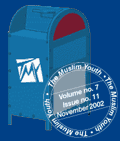 |
|
One of the attributes of Allah, the Almighty is
"the All-Wise". Wisdom is the perfection of acts and placing everything in the
most appropriate and fitting place in every situation. This entails that all the acts
of worship, or rather rituals, set forth for man by Allah, the Almighty, must be fully
suitable and completely fit for man's life and practices. Otherwise, wisdom would be
meaningless and rendering itself useless. Muslims believe that there is true wisdom
in fasting, regardless if they truly recognize, comprehend, see it or not. Such wisdom
also, may be known some, and unknown to others. There is, however, great wisdom and tremendous value in observing fasting during the month of Ramadan, namely: A) Fasting is a noble act that a Muslim does in compliance with others orders, instructions and regulations, as well as, with complete and hear felt obediance to the commands of His Rab, Allah, the Almighty, in demonstration of his love, respect, appreciation full humility and slavery to his Rab. Fasting is an act of worship that moves one closer to His creator, Allah, the Almighty. During fasting, one will deny himself personal whims, desires, interests giving them up (temporarily) for the cause of Allah, the Almighty. The fasting person will temporarily deny love and the fulfillments preference to a permanent life in the Hereafter over this temporal and short term materialistic world. B) Fasting is a means of training oneself to become a more pious, righteous and God-fearing person. This concept is inferred in the verses of the Glorious Qur'an: "O you who believe! Observing As-Saum (the fasting) is prescribed for you as it was prescribed for those before you, that you may become Al-Muttaqun." (2:183) C) A fasting person is required to observe piety, a concept that can't be expressed by words, books, lessons or anything else. Piety is simply "every good and noble acts or say that pleases the Rab, and avoiding all harmful acts and words that displease Him, the Almighty." Piety is the preparation for the departure from this word, the enforcement of the rules and regulations of Allah and the acceptance of the gifts of the Lord regardless of their physical amount of calue. Such concept can not be studies in school, learning from books, or taught by Man. Rather, they are inferred, concluded and obtained as a result of sacrifice, devotion, prayer, and all other noble characteristics that man, in general, and Muslims, in particular, must willingly posses. A fasting person must realize that this act of worship is not meant for torture and penalty. Fasting is meant to benefit man, rather than hurting or harming him. Bukhari reported that Allah’s Messenger, peace be upon him, said: "He who does not quit acting and saying false statements (Zoor), there is no need for Allah, the Almighty to see such a person denying himself his food and (lawful) drinks." “Zoor” or false acts and statements here mean all harmful and unlawful acts, and say, such as telling lies, fabricating them, condoning them, approving them, promoting them or the like. All other undesirable statements of this kind are unlawful. All acts that Muslim (fasting and non-fasting) must avoid. Acts of betrayal, cheating, deception, embezzlement, hitting others by any means without any legitimate reason and confiscating the wealth of others without a valid or legitimate reason in also categorized among this kind of unlawful acts. Similarly, listening to music ( loud or soft) is also an unlawful act that a true Muslim, a sound believer and a committed person must avoid at any cost and at all times, due to the fact that such activities may entail, invite, promote or induce other unlawful acts. If a Muslim acts upon the concept of the quoted verse and Hadith of the Prophet, peace be upon him, he will strengthen his path and improve his manners, behavior, attitude and character. Such a person will have a control over his desires during the month of Ramadan and will be immensely affected and achieve great success in his life. D) One aspect of wisdom that can acquired during the month of Ramadan is that a rich or wealth person will recognize, confirm and admit the graces and bounties of Allah, the Almighty, over him by experiencing self denial, and a touch of hunger which will enable such a person to associate, sympathize and appreciate the plight of the poor. This will lead to donations, sharing and generosity to the needy, poor and the unfortunates in the society. E) Another aspect of the wisdom of fasting, in addition to those states earlier, is the self-control, observation and self-denial. A person who successfully passes the fasting experience will be definitely capable of controlling and leading himself in every good direction. One will become capable of controlling selfish drives, emotions, earthly desires, and instincts. F) Yet another significant benefit of observing fast is the relaxation of the stomach by reducing the intake of food. Consequently, this entails less work for the digestive system, clearing it properly and the removal of harmful residues. Source: Sheikh Mohammad bin Salih Al-Othaimeen, and Sheikh Abdullah bin Abdul Rahman Al-Jibreen. Fatwawa on Fasting, Zakat & Traweeh. DAR-US-SALAM, Riyadh, Saudi Arabia |









